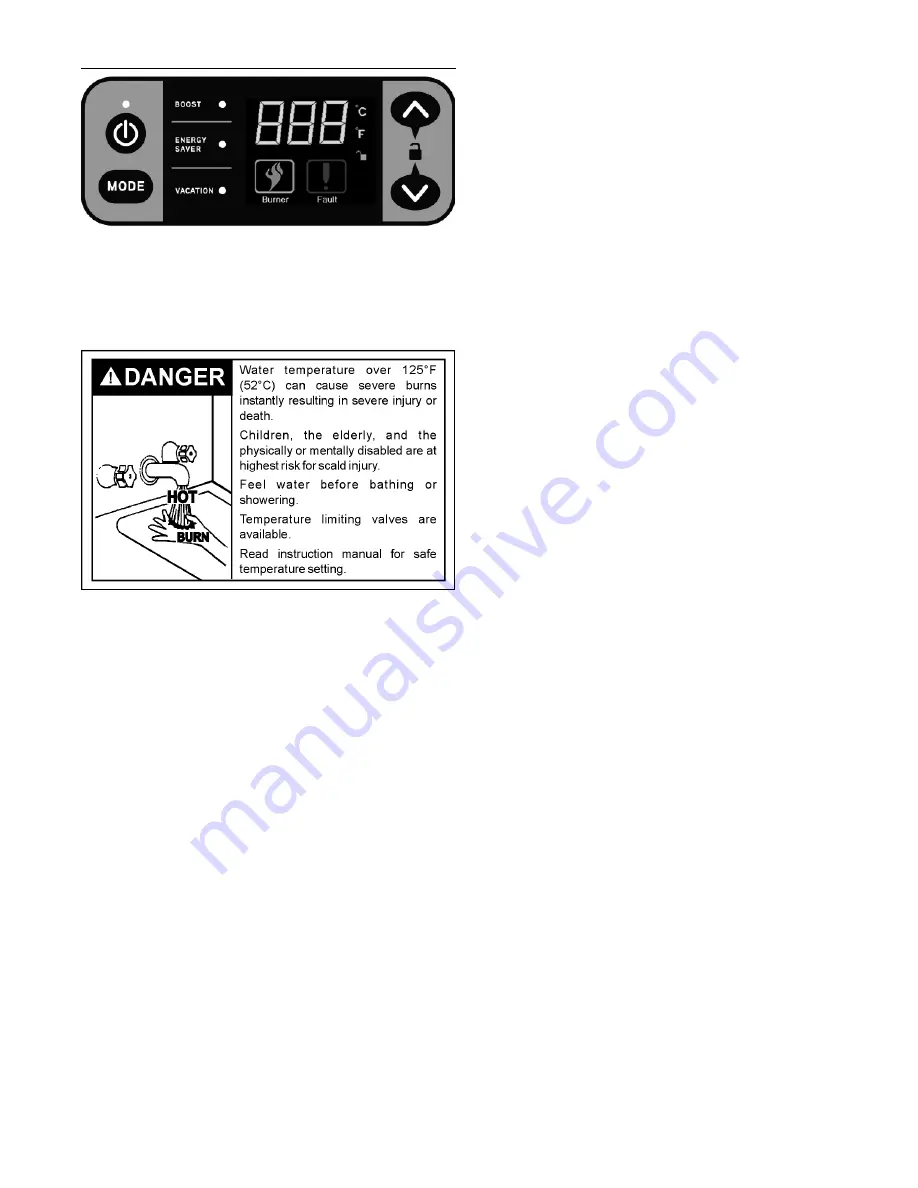
38 www.hotwater.com
TEMPERATURE REGULATION
FIGURE 35
It is recommended that lower water temperatures be used
to avoid the risk of scalding. It is further recommended,
in all cases, that the water temperatures be set for the
lowest temperature which satis
fi
es your hot water needs.
This will also provide the most energy ef
fi
cient operation
of the water heater.
HOT WATER CAN SCALD: Water heaters are intended to
produce hot water. Water heated to a temperature which
will satisfy space heating, clothes washing, dish washing,
and other sanitizing needs can scald and permanently
injure you upon contact. Some people are more likely to
be permanently injured by hot water than others. These
include the elderly, children, the in
fi
rm, or physically/
mentally handicapped. If anyone using hot water from this
heater
fi
ts into one of these groups or if there is a local code
or state law requiring a certain temperature water at the
hot water tap, then you must take special precautions. In
addition to using the lowest possible temperature setting
that satis
fi
es your hot water needs, a means such as a
mixing valve, should be used at the hot water taps used
by these people or at the water heater. Mixing valves are
available at plumbing supply or hardware stores (see
Figure 3). Follow manufacturer’s instructions for installation
of the valves. Before changing the factory setting on the
thermostat, read the “Temperature Regulation” section in
this manual.
Never allow small children to use a hot water tap, or to draw
their own bath water. Never leave a child or handicapped
person unattended in a bathtub or shower.
The water heater should be located in an area where
the general public does not have access. If a suitable
area is not available, a cover should be installed over the
thermostat to prevent tampering. The water temperature
setting was factory set at the lowest temperature;
THIS WATER HEATER IS EQUIPPED WITH AN
ADJUSTABLE THERMOSTAT TO CONTROL WATER
TEMPERATURE. HOT WATER TEMPERATURES
REQUIRED FOR AUTOMATIC DISHWASHER AND
LAUNDRY USE CAN CAUSE SCALD BURNS RESULTING
IN SERIOUS PERSONAL INJURY AND/OR DEATH.
THE TEMPERATURE AT WHICH INJURY OCCURS
VARIES WITH THE PERSON’S AGE AND THE TIME
OF THE EXPOSURE. THE SLOWER RESPONSE
TIME OF CHILDREN, AGED OR DISABLED PERSONS
INCREASES THE HAZARDS TO THEM. NEVER ALLOW
SMALL CHILDREN TO USE A HOT WATER TAP, OR
TO DRAW THEIR OWN BATH WATER. NEVER LEAVE
A CHILD OR DISABLED PERSON UNATTENDED IN A
BATHTUB OR SHOWER.
THE WATER HEATER SHOULD BE LOCATED IN AN
AREA WHERE THE GENERAL PUBLIC DOES NOT
HAVE ACCESS TO SET TEMPERATURES.
SETTING THE WATER HEATER TEMPERATURE
AT 120°F (49°C) WILL REDUCE THE RISK OF
SCALDS. Some states require settings at speci
fi
c lower
temperatures.
The water temperature is controlled using the Temperature
Control on the Display at the front of the unit (see Figure
3). This control utilizes a temperature probe to determine
the tank temperature. The primary temperature probe is
located at the top of the tank.
The temperature may be adjusted from 90°F (32°C) to
158°F (70°C). The thermostat was adjusted to 105°F
(43°C) before the heater was shipped from the factory. It
is recommended that lower water temperature be used
to avoid the risk of scalding. It is further recommended, in
all cases, that the water temperature be set for the lowest
temperature which satis
fi
es your hot water needs. This
will also provide the most energy ef
fi
cient operation of the
water heater and minimize scale formation.
Valves for reducing the point-of-use temperature by mixing
cold and hot water are available (see Figure 2). Also
available are inexpensive devices that attach to faucets to
limit hot water temperatures. Contact a licensed plumber
or the local plumbing authority.
The table below shows the approximate time-to-burn
relationship for normal adult skin. Short repeated heating
cycles caused by small hot water uses can cause
temperatures at the point of use to exceed the thermostat
setting by up to 20°F (11°C). If you experience this type of
use, you should consider using lower temperature settings
to reduce scald hazards.
Summary of Contents for POWER VENT GAS
Page 4: ...4 www hotwater com GENERAL SAFETY...
Page 7: ...www hotwater com 7...
Page 58: ...58 www hotwater com NOTES...
Page 59: ...www hotwater com 59 NOTES...
















































